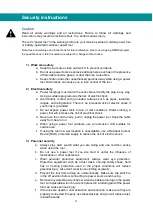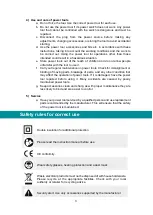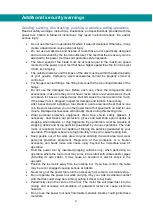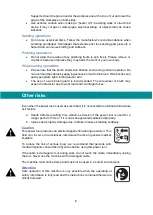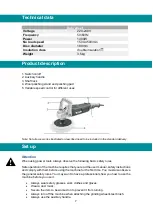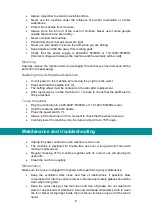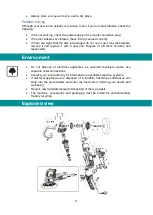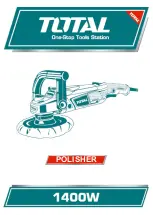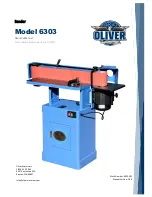
2
Security instructions
Caution
Read all safety warnings and all instructions. Failure to follow all warnings and
instructions may result in electrical shock, fire, and/or serious injury.
The term “power tool” in the warnings refers to your mains-operated (corded) power tool
or battery-operated (cordless) power tool.
Note: Save all warnings and instructions for future reference. Due to our ongoing R&D&I program,
the specifications in this document are subject to change without notice.
1) Work area safety
a. Keep the work area clean and well lit to prevent accidents.
b. Do not use power tools in explosive atmospheres, such as in the presence
of flammable liquids, gases, or dust that can cause fires.
c. Keep children and other unauthorized persons away while using a power
tool. Distractions can cause you to lose control of the tool.
2) Electrical safety
a. Power tool plugs must match the outlet. Never modify the plug in any way.
Using a suitable plug reduces the risk of electric shock.
b. Avoid bodily contact with grounded surfaces such as pipes, radiators,
ranges, and refrigerators. There is an increased risk of electric shock if
your body is grounded.
c. Do not expose power tools to rain or wet conditions. Water entering a
power tool will increase the risk of electrical shock.
d. Never use the cord to carry, pull or unplug the power tool. Keep the cable
away from heat or oil.
e. When using a power tool outdoors, use an extension cord suitable for
outdoor use.
f. If using the tool in a wet location is unavoidable, use a Residual Current
Device (RCD) protected supply to reduce the risk of electric shock.
3) Personal security
a. Always stay alert, watch what you are doing and use common sense
when using the tool.
b. Do not use a power tool if you are tired or under the influence of
medication or other substances.
c. Wear personal protective equipment. Always wear eye protection.
Protective equipment such as a dust mask, non-slip safety shoes, hard
hat, or hearing protection used in the proper conditions will reduce
personal injury. Also don't wear loose clothing or jewelry.
d. Prevent the tool from turning on unintentionally. Make sure the switch is
in the off position before connecting to power source and moving.
e. Remove any adjusting wrenches or wrenches before turning on the power
tool. An adjustable wrench or wrench placed in a rotating part of the power
tool can cause serious injury.
f. If devices are used for dust extraction and collection, make sure they are
properly connected. Properly use these devices and you will reduce dust-
related hazards.
Summary of Contents for TP1141806
Page 1: ...1 v POLISHER...
Page 10: ...10 POLISHER...


